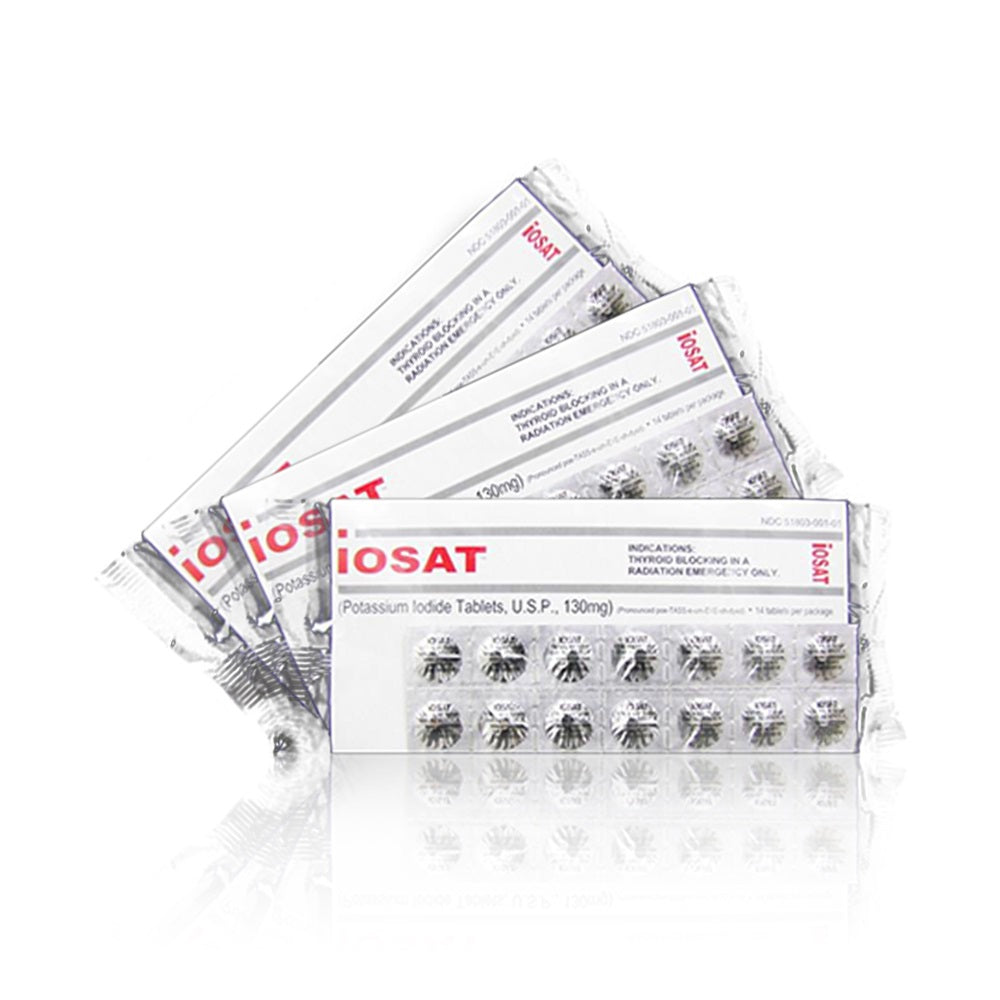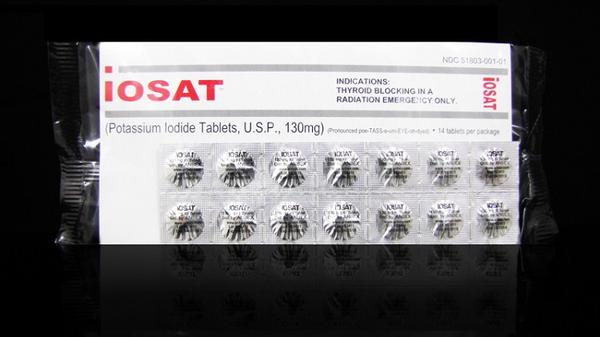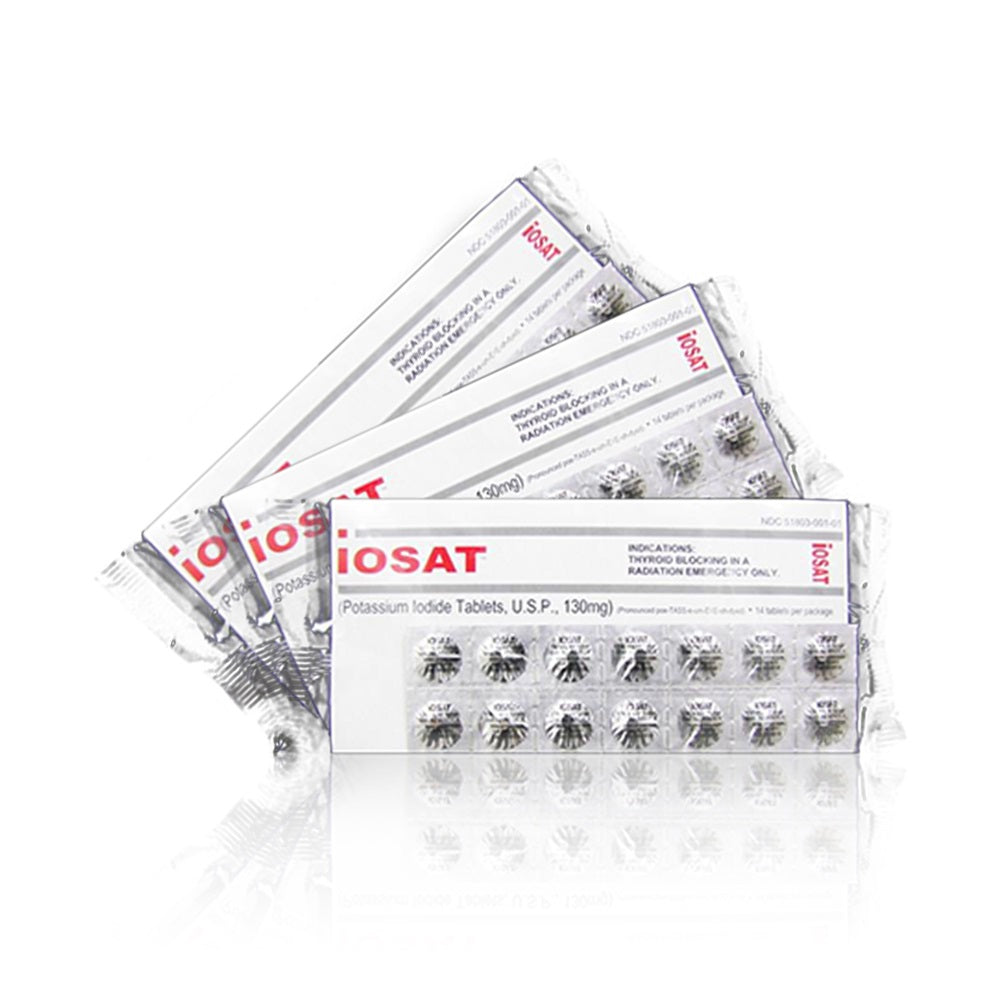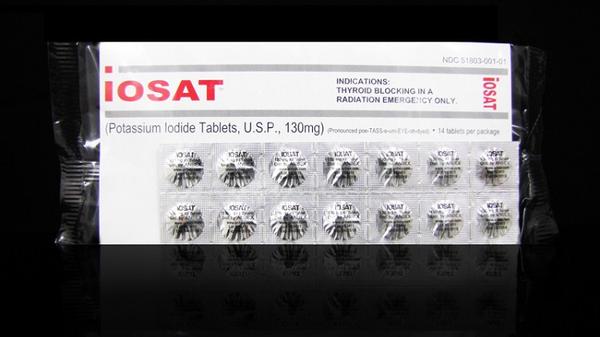Best by date: April 30, 2032
These are 100% genuine IOSAT potassium iodide tablets that we purchased directly from the manufacturer. There are 14 tablets per pack. Each tablet contains 130mg of potassium iodide.
* BEWARE of fake (counterfeit) KI pills sold on Amazon.com at seemingly "discount" prices. When it comes time to use these for protection against radiation, you don't want to find out you've been duped.
Potassium iodide is an essential part of any emergency preparedness kit!
From the manufacturer's website:
Following the meltdown at Three Mile Island nuclear plant in 1979, ANBEX developed iOSAT™ for protection from an accidental or terrorist related release of radioactive iodine from a nuclear power plant or nuclear weapon.
iOSAT™ received its approval from the US Food and Drug Administration in 1982, and is the only full-strength tablet for radiation blocking which may legally be sold in the US. Only iOSAT™ has passed all FDA tests for purity, quality, safety and efficacy.
Information from the CDC:
What is Potassium Iodide (KI)?
Potassium iodide (also called KI) is a salt of stable (not radioactive) iodine. Stable iodine is an important chemical needed by the body to make thyroid hormones. Most of the stable iodine in our bodies comes from the food we eat. KI is stable iodine in a medicine form. This fact sheet from the Centers for Disease Control and Prevention (CDC) gives you some basic information about KI. It explains what you should think about before you or a family member takes KI.
What does KI do?
Following a radiological or nuclear event, radioactive iodine may be released into the air and then be breathed into the lungs. Radioactive iodine may also contaminate the local food supply and get into the body through food or through drink. When radioactive materials get into the body through breathing, eating, or drinking, we say that “
internal contamination” has occurred. In the case of internal contamination with radioactive iodine, the thyroid gland quickly absorbs this chemical. Radioactive iodine absorbed by the thyroid can then injure the gland. Because non-radioactive KI acts to block radioactive iodine from being taken into the thyroid gland, it can help protect this gland from injury.
What KI cannot do
Knowing what KI cannot do is also important. KI cannot prevent radioactive iodine from entering the body. KI can protect only the thyroid from radioactive iodine, not other parts of the body. KI cannot reverse the health effects caused by radioactive iodine once damage to the thyroid has occurred. KI cannot protect the body from radioactive elements other than radioactive iodine—if radioactive iodine is not present, taking KI is not protective.
How does KI work?
The thyroid gland cannot tell the difference between stable and radioactive iodine and will absorb both. KI works by blocking radioactive iodine from entering the thyroid. When a person takes KI, the stable iodine in the medicine gets absorbed by the thyroid. Because KI contains so much stable iodine, the thyroid gland becomes “full” and cannot absorb any more iodine—either stable or radioactive—for the next 24 hours.
Iodized table salt also contains iodine; iodized table salt contains enough iodine to keep most people healthy under normal conditions. However, table salt does not contain enough iodine to block radioactive iodine from getting into your thyroid gland. You should not use table salt as a substitute for KI.
How well does KI work?
Knowing that KI may not give a person 100% protection against radioactive iodine is important. How well KI blocks radioactive iodine depends on:
- how much time passes between contamination with radioactive iodine and the taking of KI (the sooner a person takes KI, the better),
- how fast KI is absorbed into the blood, and
- the total amount of radioactive iodine to which a person is exposed.
Who should take KI?
The thyroid glands of a fetus and of an infant are most at risk of injury from radioactive iodine. Young children and people with low stores of iodine in their thyroid are also at risk of thyroid injury.
Infants (including breast-fed infants): Infants need to be given the recommended dosage of KI for babies (
see How much KI should I take?). The amount of KI that gets into breast milk is not enough to protect breast-fed infants from exposure to radioactive iodine. The proper dose of KI given to a nursing infant will help protect it from radioactive iodine that it breathes in or drinks in breast milk.
Children: The United States Food and Drug Administration (FDA) recommends that all children internally contaminated with (or likely to be internally contaminated with) radioactive iodine take KI, unless they have known allergies to iodine. Children from newborn to 18 years of age are the most sensitive to the potentially harmful effects of radioactive iodine.
Young Adults: The FDA recommends that young adults (between the ages of 18 and 40 years) internally contaminated with (or likely to be internally contaminated with) radioactive iodine take the recommended dose of KI. Young adults are less sensitive to the effects of radioactive iodine than are children.
Pregnant Women: Because all forms of iodine cross the placenta, pregnant women should take KI to protect the growing fetus. However, pregnant women should take only one dose of KI following internal contamination with (or likely internal contamination with) radioactive iodine.
Breastfeeding Women: Women who are breastfeeding should take only one dose of KI if they have been internally contaminated with (or are likely to be internally contaminated with) radioactive iodine. Because radioactive iodine quickly gets into breast milk, CDC recommends that women internally contaminated with (or are likely to be internally contaminated with) radioactive iodine stop breastfeeding and feed their child baby formula or other food if it is available. If breast milk is the only food available for an infant, nursing should continue.
Adults: Adults older than 40 years should not take KI unless public health or emergency management officials say that contamination with a very large dose of radioactive iodine is expected. Adults older than 40 years have the lowest chance of developing thyroid cancer or thyroid injury after contamination with radioactive iodine. They also have a greater chance of having allergic reactions to KI.
When should I take KI?
The primary protective measures after a radiologic or nuclear event are sheltering or evacuation. Local public health or emergency management officials will tell the public if KI or other protective actions are needed. For example, public health officials may advise you to remain in your home, school, or place of work (this is known as “shelter-in-place”) or to evacuate. You may also be told not to eat some foods and not to drink some beverages until a safe supply can be brought in from outside the affected area. Following the instructions given to you by these authorities can lower the amount of radioactive iodine that enters your body and lower the risk of serious injury to your thyroid gland.
How much KI should I take?
The FDA has approved two different forms of KI—tablets and liquid—that people can take by mouth after a nuclear radiation emergency. Tablets come in two strengths, 130 milligram (mg) and 65 mg. The tablets are scored so they may be cut into smaller pieces for lower doses. Each milliliter (mL) of the oral liquid solution contains 65 mg of KI.
According to the FDA, the following doses are appropriate to take after internal contamination with (or likely internal contamination with) radioactive iodine:
- Adults should take 130 mg (one 130 mg tablet OR two 65 mg tablets OR two mL of solution).
- Women who are breastfeeding should take the adult dose of 130 mg.
- Children between 3 and 18 years of age should take 65 mg (one 65 mg tablet OR 1 mL of solution). Children who are adult size (greater than or equal to 150 pounds) should take the full adult dose, regardless of their age.
- Infants and children between 1 month and 3 years of age should take 32 mg (½ of a 65 mg tablet OR ½ mL of solution). This dose is for both nursing and non-nursing infants and children.
- Newborns from birth to 1 month of age should be given 16 mg (¼ of a 65 mg tablet or ¼ mL of solution). This dose is for both nursing and non-nursing newborn infants.
How often should I take KI?
A single dose of KI protects the thyroid gland for 24 hours. A one-time dose at the levels recommended in this fact sheet is usually all that is needed to protect the thyroid gland. In some cases, radioactive iodine might be in the environment for more than 24 hours. If that happens, local emergency management or public health officials may tell you to take one dose of KI every 24 hours for a few days. You should do this only on the advice of emergency management officials, public health officials, or your doctor. Avoid repeat dosing with KI for pregnant and breastfeeding women and newborn infants. Those individuals may need to be evacuated until levels of radioactive iodine in the environment fall.
Taking a higher dose of KI, or taking KI more often than recommended, does not offer more protection and can cause severe illness or death.
Medical conditions that may make it harmful to take KI
Taking KI may be harmful for some people because of the high levels of iodine in this medicine. You should not take KI if:
• you know you are allergic to iodine (If you are unsure about this, consult your doctor. A seafood or shellfish allergy does not necessarily mean that you are allergic to iodine.) or
• you have certain skin disorders (such as dermatitis herpetiformis or urticaria vasculitis).
People with thyroid disease (for example, multinodular goiter, Graves’ disease, or autoimmune thyroiditis) may be treated with KI. This should happen under careful supervision of a doctor, especially if dosing lasts for more than a few days.
In all cases, talk to your doctor if you are not sure whether to take KI.
What are the possible risks and side effects of KI?
When public health or emergency management officials tell the public to take KI following a radiologic or nuclear event, the benefits of taking this drug outweigh the risks. This is true for all age groups. Some general side effects caused by KI may include intestinal upset, allergic reactions (possibly severe), rashes and inflammation of the salivary glands.
When taken as recommended, KI causes only rare adverse health effects that specifically involve the thyroid gland. In general, you are more likely to have an adverse health effect involving the thyroid gland if you:
- take a higher than recommended dose of KI,
- take the drug for several days, or
- have pre-existing thyroid disease.
Newborn infants (less than 1 month old) who receive more than one dose of KI are at particular risk for developing a condition known as hypothyroidism (thyroid hormone levels that are too low). If not treated, hypothyroidism can cause brain damage. Infants who receive KI should have their thyroid hormone levels checked and monitored by a doctor. Avoid repeat dosing of KI in newborns.
Where can I get KI?
KI is available without a prescription. You should talk to your pharmacist to get KI and for directions about how to take it correctly. Your pharmacist can sell you KI brands that have been approved by the FDA.








